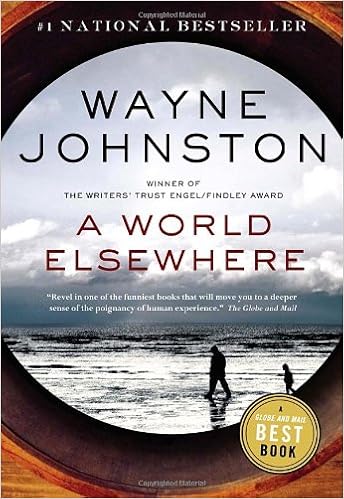Today, May
22, is Wayne Johnston’s 58th birthday. He is
Canadian novelist from Newfoundland who has written nine novels. I posted my review of his most recent novel, The Son of a Certain Woman, on December
10, 2015: http://schatjesshelves.blogspot.ca/2015/12/book-advent-calendar-day-10-son-of.html.
In honour
of his birthday, I’m posting my review of another of his novels, A World Elsewhere:
4
Stars

Landish B.
Druken is a struggling Newfoundland writer who adopts Deacon, a child whose
father died while sealing with Landish's father. Destitute because he is
disowned by his father for not taking up sealing, Landish contacts his one-time
friend, the ultra-wealthy Padget (Van) Vanderluyden, for help. Their friendship
ended because of a plagiarism scandal in Princeton but their relationship, albeit
a toxic one, is resumed when Van "rescues" Landish and Deacon by
bringing them to Vanderland, his great American castle in North Carolina. (Yes,
the Vanderbilt's Biltmore is the inspiration.)
Landish is
totally unsuccessful as a novelist; he made a vow to "'write a book that
will put in their places everyone who has ever lived'" (1) but
"Landish wrote every night, and every night burned what he wrote because
it wasn't good enough" (10). His best stories are those he tells Deacon to
explain the world. For example, he explains the duties of a ship's crew:
". . . the men in charge of engines had what were known as 'engine ears,'
which meant that they were deaf from the noise the engines made. Also there
were pursers who made sure that no one's purse was stolen. There were men
called stewards who were in charge of serving stew. And other men called
porters who were in charge of serving port" (109). Landish is a drunkard
and wastrel, but one cannot but admire his quick wit, and his love for Deacon
is certainly a redeeming quality.
Van, on the
other hand, is an emotional cripple. He is a totally selfish man who sees
people as possessions which he can control with his money. He will stop at
nothing to get what or who he wants. In Princeton he devises a scheme to have
Landish expelled in the hopes that Landish will then have no choice but to join
him as his "'lifelong guest'" (22) in the Vanderland he proposes to
build. When the two are eventually reunited, Van tells Landish, "'You may
not leave Vanderland for any reason without my permission . . .'" (138).
Likewise, he keeps his daughter a prisoner: "'[Godwin] has lived all her
life at Vanderland and will not leave it, not even for a minute, until she is
twenty-one . . . '" (138). Deceit, bribery and blackmail are techniques he
employs with skill.
A major
theme is father-son relationships. Van's father rarely spoke to him and treated
him with scorn when he did; he even left him only one-tenth of what the other
children received. Abram Druken disowns Landish and bequeaths him only a
whitecoat hat. It is the relationship between Landish and Druken that seems to
be the exception.
The
outstanding quality of the book is its prose. Anagrams, puns, rhymes and
neologisms abound. Food is a pre-occupation when Landish and Deacon have barely
enough to survive; to take his mind off his hunger pangs, Landish makes up food
puns: "The Merchant of Venison. Broth fresh from the brothel. A
sacrificial lamb was a mutton for punishment. . . . He would write Van and tell
him they had dined tonight on Sham Chowder, Lack of Lamb, Crazed Ham and Duck a
Mirage. Steam of Mushroom Soup and Perish Jubilee" (52). Landish's
description of the stages of life is ingenious: "You go from the Womb of
Time into the womb of your mother and from there into the world. The world
leads to the Tomb of Time, the place from which no one knows the way back home.
. . . [Y]ou passed from the Womb of Time into what he called your birth 'Murk,'
which was the interval between your 'commencement screech' and the first moment
of your life that you remembered. . . . Landish also told Deacon about Just
Mist - the realm of things that at one time were possible but had never
happened" (35 - 37).
It is this
wonderful prose that makes the book worthy of reading. It is not my favourite
of Johnston's books, but I would recommend it for its wonderful playfulness
with language.
No comments:
Post a Comment